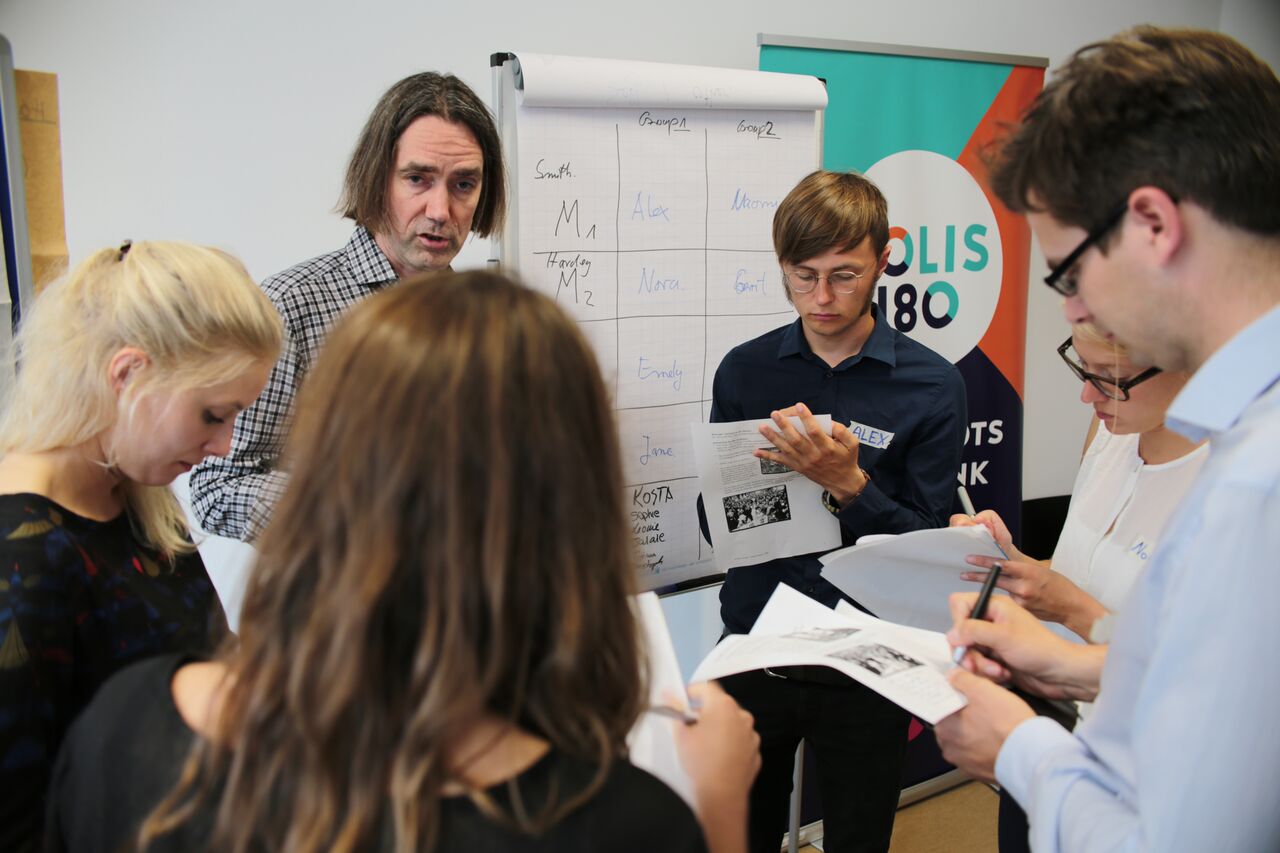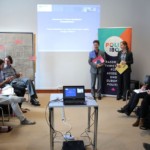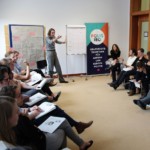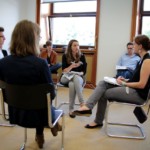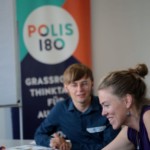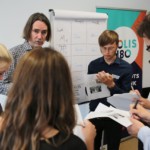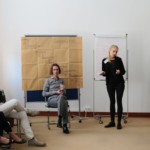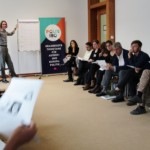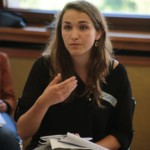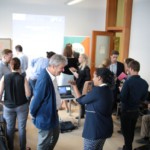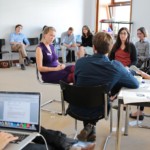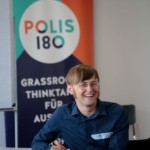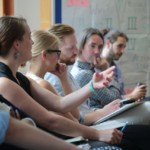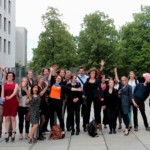LET’S MEDIATE! On July 5, Polis180 offered a one-day introductory training on peace mediation for students and young professionals at the German Federal Foreign Office in Berlin. The workshop was held as a side event to the high-level expert conference “The OSCE as Mediator” in the context of the German chairmanship to the OSCE and aimed at engaging young people in non-violent approaches to international conflict resolution.
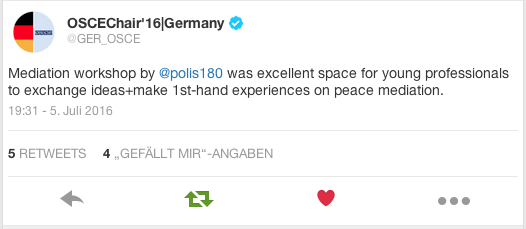
– OSCEChair’16|Germany @GER_OSCE 5. Juli 2016
Oliver Wolleh, Trainer at Berghof Foundation, an approved expert in mediation and peace education with a long-time work experience in the field, conducted the training. Elsa Benhöfer from Polis180 assisted him throughout the practical training sessions.
Following an introduction into the theoretical and methodological basics of mediation, the 25 participants familiarized with important concepts such as Johan Galtungs conflict cycle and the dynamic nine-stage model of conflict escalation by Friedrich Glasl. However, the focus of the tutorial was to explore possibilities for breaking the self-sustaining dynamics of a conflict through mediation. In realistic scenarios, the participants experimented how to ask the right questions, distinguish between objective and subjective dimensions of a conflict and learned how important it is to reflect the roles, perspectives and behavior of conflict parties towards each other in order to promote a change of behavior.
Core of the training was an interactive role play in which participants learned how a mediator could reply to challenging statements from the conflict parties and get to the point. This practical exercise embraced an introduction into the mediation cycle as well as methods to identify the underlying interests and needs of conflict parties, untangle their positions and crystallize possible solutions. Even though a mediator can play a very important role, the conflict parties remain responsible and keep ownership of the conflict and possible solutions. As the simulations showed, it is the conflict parties themselves who, in the end, need to agree on a common ground and further steps of action.
Another emphasis of the event was the linkage between mediation and current international conflicts. For the OSCE summit in 2016, mediation represents one key element of the German chairmanships agenda. Dagmar Deutges from the German Federal Foreign Ministry depicted the German involvement in peace mediation. In 2016, for the first time, Attachés and diplomats took part in a special training on mediation. The federal government concentrates on cooperation with multilateral actors such as the OSCE and supports mediation projects in Sudan, Mali and Ukraine. As Germany finds itself still at a start-up level in mediation and needs capacity building to a considerable degree, partnerships with more experienced countries such as Switzerland, Norway and Finland are essential for a growing German involvement and responsibility in international mediation.
The Polis180 mediation workshop was the kick-off for a long-term engagement on civil conflict transformation and peace mediation of the organization. The project “Mediation in Foreign Policy” that is part of the Polis180 Programme on Peace and Security was set up and will continue to host events, workshops and practical trainings. It is our goal to promote inclusivity and foster awareness of civil society and youth throughout all phases of conflict management. If you want to get involved contact us! We are looking forward for you to join Polis180!
all pictures taken by Andrey Dolmov

Elsa Benhöfer studied Political Science, Economics, and Public Law at the universities of Jena, Brno and Marburg, where she worked on the research project „Dynamics of Security“ in the Department of International Relations from 2014-2016. Besides (research) internships at the University in Islamabad and the Federal Foreign Office, she is currently working as an itern at GIZ in the Working Group for Peace and Development. Elsa is active in the Peace and Security Programme.

Julian is a graduate student in International Studies / Peace and Conflict Studies. After work-related stations at Berghof Foundation and the German Federal Foreign Office, he is currently finalizing his thesis on gender norms diffusion in peace mediation. Julian works for the Peace Research Institute Frankfurt and is engaged in several projects of Polis180’s Peace and Security Pogramme.

Nina Bernarding works on dialogue and mediation processes, now mainly in Southeast Europe. She supports the Dialogue, Mediation and Peace Support Structures Programme of the Berghof Foundation as Project Assistant. As a Mercator Fellow on International Affairs, she worked with Conciliation Resources on peace negotiations in East Africa and with UNDP on the national dialogue process in Sudan. Nina graduated from King’s College London in 2013. She is active in the Programme Peace and Security and project coordinator for Mediation in Foreign Policy at Polis180.

Sophie Falsini is a graduate student in European studies, majoring in Eastern Europe. She is currently doing an internship at Human Rights Watch and she is planning on researching the role of civil society in Ukraine. She is active in Polis180’s Peace and Security Programme.

Nico Schernbeck works and does research on the topics of cooperative security, regional conflict management and mediation. For the Berghof Foundation, he works as a project manager in the programme „Dialogue, Mediation and Peace Support Structures“. At the same time he assists as a research associate at the Peace Research Institute Frankfurt in the Task Force OSCE Chairmanship at the Federal Foreign Office for the year of 2016. Nico is active in the Programme Peace and Security and project coordinator for Mediation in Foreign Policy at Polis180.

Rahel Freist-Held studies Social Sciences and Cultural Studies at the Humbolt University of Berlin and the University of Amsterdam. She spent one year with the GIZ in Johannesburg and has worked as an intern for the German Bundestag in the OSCE Special Representative Office of Gernot Erler. She is currently working for the Körber Foundation in Berlin. For Polis180 she leads the Programme of Peace and Security.
